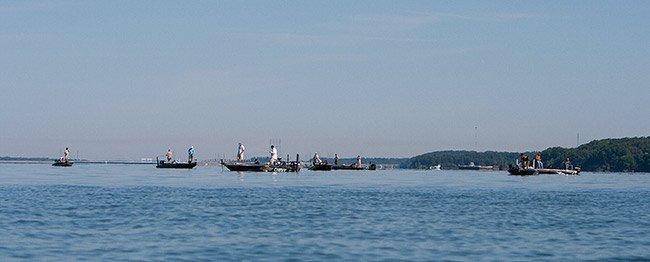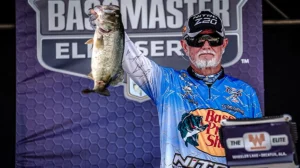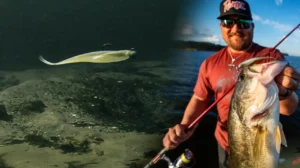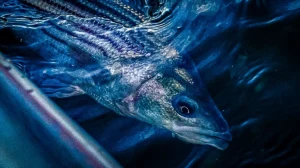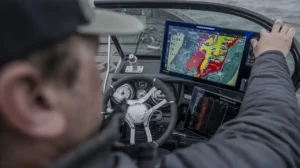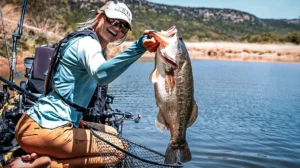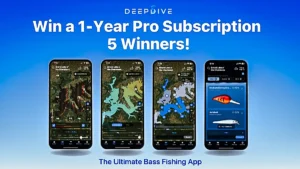Professional anglers are the best in the world when it comes to overcoming adverse fishing conditions. Whether they are facing torrential winds, 6-foot swells or brutal cold fronts, these guys will put fish in the boat when many anglers will want to go to the house. There is one condition, however, that even the most accomplished professionals loathe: fishing in big crowds.
These anglers spend countless hours searching for bass fishing nirvana – perfect structure, great water conditions and limited fishing pressure. However, circumstances and, lately, restrictive tournament boundaries sometimes force the pros to get up close and personal with each other.
Megabass pro Aaron Martens is known for his ability to fish effectively in crowded areas. We all remember watching him battle it out with KVD in the 2011 Classic and most recently in the 2012 Green Bay Challenge, sharing water with the likes of Ott DeFoe, Terry Scroggins and Mark Davis. Martens believes that four key elements enable him to catch more bass in crowded areas.
Attitude
When your most productive areas are covered with other anglers, it can really take a toll on your state of mind. Optimism, flexibility and open mindedness are valuable antidotes.
Most folks that follow professional fishing and Aaron Martens have noticed a more upbeat and positive angler this season, and it has reflected in his fishing.
“You absolutely have to stay open-minded and relaxed,” Martens said. “It’s too easy to get stuck on a few select places when you’re surrounded by boats. It’s important to have the confidence to leave a good area in order to look for something better.”
During the 2012 Green Bay Challenge, Martens believes his willingness to “stay put” cost him the victory. Although several of his best waypoints were often swamped with upwards of 20 boats, he recognizes that he should have stayed the course and ignored the significant fishing pressure.
“I had the fish figured out really well in practice, despite the heavy fishing pressure,” he said. “Several of the other guys weren’t fishing these spots the same way that I was. I should have taken advantage of that. I blew off a few of my more crowded spots when I should have covered more water fishing my strengths.”
According to the Elite Series pro, unconventional methods help him refocus and ignore the surrounding madness. For the first time in his professional career, Martens looked to his iPod for a much-needed distraction.
“I had never really done that in the past, because I like to have total concentration when I fish. This time, however, I needed something to drown out my surroundings in order to focus my mind.”
Lure Presentation
While a natural bait presentation is always important, it is paramount when surrounded by a multitude of other anglers. Martens goes to great lengths to assure the proper presentation of his bait while fishing crowded water.
“Attention to detail is everything,” said the meticulous pro. “If I see some guys catching a few bass on 8-pound line, I will generally downsize to 6-pound line in order to give the bait a better presentation. My go-to bait in crowded scenarios is usually a 6-inch Roboworm. It displays a ton of natural action, and when they’re eating it, nothing else compares.”
When considering lure presentation, he is very observant of wind speed and current.
Even if there is no wind, there is always current. It may be less than 1 mph, but it is still there, and it still matters. You have to look beyond the obvious when battling other anglers for water. Your opponent may be picking off a few bass here and there, but you can catch tons of fish when you present the bait correctly. Bass position toward the current to ambush prey, and if you’re working your bait from the opposite direction, you are not going to get as many bites. Casting into the wind isn’t always fun, but you’ll catch more fish if you do.
Boat Positioning
While many anglers prefer to fish the areas leading into their productive spots, Martens does the exact opposite while fishing crowded water. Throughout the Green Bay Challenge, he targeted small schools of fish that were holding in very specific areas. In order to maximize his efficiency, he went straight to his waypoints without wasting time elsewhere.
“I really made an effort to fish only my most productive areas. I wanted to get straight to these areas quickly because it decreased the chance of other anglers easing in on me,” Martens said. “Whenever I landed a fish, I would make sure to immediately get my Phoenix back into position. As soon as I put the fish in the livewell, I would get on the trolling motor to reclaim my spot. You have to play a little defense in crowded water.”
Time Management
Effectively managing one’s tournament time is always important, but Martens considers it even more important in tight confines.
“If I know ahead of time that a fishery is going to fish relatively small, I will cover more water during the practice period,” he said. “This allows me to have multiple backup areas. If a bunch of boats are piled on a few of your spots, you can run around and hit other, less pressured areas. I wish I would have done this a little more on Lake Michigan.”
While Martens doesn’t necessarily mind fishing in crowds, he does acknowledge that there is a limit to the amount of fishing pressure that an area can withstand.
“While I don’t prefer bumping boats with other guys, I can deal with it to an extent. We’re all buddies out there. However, when you stop getting bites, sometimes it’s better to start running and gunning. Bass will get used to fishing pressure and eventually they’ll just shut down.”
The next time you find yourself competing in tight quarters, don’t let the fishing pressure get the best of you. A positive attitude, natural bait presentation, effective boat positioning and conscious time management will put more fish in your livewell. Remember: you’re fishing against the fish, not the anglers.


